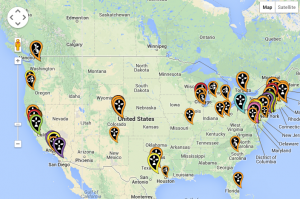Food Justice Subscribe
A selection of initiatives, blogs, resources and communities on Jewcology which focus on food justice.
From the Blogs
Darkness Upon the Face of the Deep
Darkness upon the Face of the Deep –חשך על פני תהום Rabbi Ed Rosenthal “In the Beginning God created the heavens and the earth. And the earth was null and void, and darkness was upon the face of the deep. And the Spirit of God hovered on the surface of the water.” (Gen.1:1-2). While we are taught that God is omnipresent and there is no place where the Divine presence does not dwell; there are few places that evoke a spiritual experience or a connection with the Divine more surely than the surface of water. ...
New Year of Jewish Learning on the Environment Materials Released!
The thirteenth topic in the Year of Jewish Learning on the Environment, We are How We Eat: A Jewish Approach to Food and Sustainability released! Rebbe Nachman of Breslov identifies the desire for food and drink as the central desire of the human being, and the one from which other desires emanate. In Rabbi Tzadok Hacohen’s “A Treatise on Eating,” he cites the mystical book of theZohar, which calls the moment of eating “the time of combat.” This is because in eating a Jew must engage in the spiritual fight to ensure the act ...
Immediate Action Required! Call your Senator for a Just Farm Bill!
As we speak, the Senate is debating the contents of the Farm Bill, which will substantially affect the next five years of US food policy. It is upon us to call our Senators and let them know that as Jews, we and our organizations support Farm Bill legislation that: reduces hunger and improves nutrition in the United States. promotes conservation and proper stewardship of the land. enables farmers in both the United States and the developing world to earn sustainable livelihoods. Every call makes a tremendous difference! The ...
My new book, “Who Stole My Religion?” is now freely available as an eBook
Shalom, Because there is much denial and ignorance about the increasing evidence that the world is approaching a climate catastrophe, as well as major food, water, and energy scarcities, I, Richard Schwartz, have decided to make the eBook version of my controversial new book, Who Stole My Religion? Revitalizing Judaism and Applying Jewish Values to Help Heal Our Imperiled Planet, FREELY available! It can be read by visiting www.whostolemyreligion.com, and scrolling down to a link directly below a picture of the book’s cover on the left side of the ...
Jewish Farm School Launches College Accredited Experiential Learning
The Jewish Farm School and Hebrew College are partnering to offer you a weeklong, intensive course exploring the intersection of Judaism, agriculture and contemporary food justice. In this week-long, service learning experience, participants will explore the relationship between Judaism, agriculture and contemporary food justice issues. This unique seminar will include farm work, text study and meetings with activists, community leaders, and business people. On the farm, you will gain hands-on experience in sustainable agriculture techniques such as planting, ...
Genetically Modified Plants To Resist Intense Drought
By David Allouche, NoCamels Photo by Gates Foundation Israeli agro-biotechnology company, Rosetta Green, has developed a new technology to develop plants that are better able to withstand prolonged periods of severe drought. The company aims to develop new plant varieties resistant to harsh climatic condition, maintaining an increased yield. The company, based in Rehovot, Israel, experimented on tobacco plants that were irrigated with seawater instead of freshwater. The genetically modified plants created by the company were able to grow under seawater ...
Third Annual MLK Weekend Food Justice Symposium “From Plant to Plate – Grow Local As Social Action”
After a year in which the KAM Isaiah Israel Congregation Social Justice Committee grew, harvested and donated over a ton of organic produce and garnered three awards, they will honor the life and work of Martin Luther King Jr. with a weekend long education and advocacy program focused on food justice and sustainability January 13th - 15th, 2012. Among the highlights are a Friday night service, a Saturday panel discussion and Sunday workshops on local food production and urban ecology. All events are held at KAMII at 1100 East Hyde Park Boulevard and are free and open ...
Jewish Urban Farming Internship
Urban Adamah, based in Berkeley, CA, is a three-month intensive residential leadership training program for young adults ages 20-29, that integrates urban organic farming, social justice work and progressive Jewish living and learning. Twelve Urban Adamah Fellows are selected each season to operate an organic farm and educational center, intern with community organizations addressing issues at the intersection of poverty, food security and environmental stewardship, and learn an approach to Jewish tradition that opens the heart and builds joyful community. Applicants do ...
Year of Jewish Learning on the Environment
Core teachings on 18 topics linking Torah and the environment were released between Tu b'Shevat 5772 and Tu b'Shevat 5773 as part of Jewcology's Year of Jewish Learning on the Environment, in partnership with Canfei Nesharim and a host of other organizations who shared materials across the Jewish community. The materials were shared at least 145 times on the web, in at least 99 social media postings, and reached over 51,000 people during the course of the year, as part of a Year of Jewish Learning on the Environment. The materials comprise the most comprehensive set of ...
My Zaide, Sukkot and Food Insecurity
As a child at Sukkot I recall my beloved Zaide Shaya Yosef Z”L eating meals and sleeping in the simple Sukkah behind his house. Zaide was a pious Jew who left his Polish shtetl, Checiny, in order to bring his wife and children to a better life in Canada. Stories my mother tells about Checiny describe a home not much more secure than Zaide’s fragile Sukkah. Access to food, especially fresh produce, was limited. The family was often hungry and malnourished. I wonder what Zaide thought and felt as he celebrated Z’man Simchateinu, the ...
Halfway Through the Food Stamp Challenge
I am at the halfway point of the one week Fighting Poverty with Faith Food Stamp Challenge. My personal challenge has been to spend the allotted $1.50/meal but with a twist: to eat organically. There is method to my madness. My understanding is that 46 million Americans live on Food Stamps to ‘supplement’ their nutritional needs. I imagine that many of these 15% of Americans live food insecure lives. This means that the availability of nutritionally adequate and safe foods or the ability to acquire acceptable food in socially acceptable ways ...
Take the Food Stamp Challenge!
Join me for the 4th annual Fighting Poverty with Faith mobilization this week by taking the Food Stamp Challenge from Thursday, October 27th through Thursday November 3rd. The challenge is to limit yourself to a food budget of $31.50/week, $4.50/day or $1.50/meal. This is the average amount allotted a person who qualifies to receive food stamps. Almost 46 million or 15% of Americans live on food stamps or SNAP. I imagine that many are hungry, undernourished and live food insecure lives. Food insecurity exists when the availability of nutritionally ...
Where Is Our Revolution? A Call for a North American Sustainable Spring!
Spring is in the air. The youth and working class of Egypt and Tunisia have overthrown their repressive regimes while Syria, Libya, Yemen, Bahrain and other Arab nations are experiencing civil unrest. In Europe, a focus on economic austerity at the expense of the youth and working class has led to clashes in France and Greece. Indigenous peoples of Bolivia, Peru and other South American countries have been working to block mining, drilling and transportation across the Andes and Amazon basin. In these parts of the world, citizens have begun to recognize their ...
Hazon’s Kosher Meat Survey: We Want to Hear from You!
At the 2006 Hazon Food Conference, we posed two key questions: 1. If you’re a meat eater, would you continue to eat meat if you had to kill it yourself? And 2. If you don’t currently eat meat, but could be involved in the process of raising and slaughtering the animal, would you? People's responses varied, but it was clear that the issue was important to nearly everyone in the room. Since 2006, the world of kosher sustainable meat has seen the Agriprocessors scandal, the rise of several kosher sustainable meat businesses and hands-on kosher slaugher ...
Environmental Tip of the Week: Buy organic food!
Cross posted on Foodiscovery and Environmental Tip of the Week Yes, it tends to be more expensive but organic growing practices are much better for the environment, and for health as well. Of course, the environment and health are connected. Folks, I just learned that workers at non-organic ("conventional") farms have died due to constant exposure to chemicals! Have a look at this discussion on Facebook for more information, websites to look at, etc. Where to buy organic food? A lot of regular grocery stores, like my QFC at University Village, now ...
The Holiness of Eating
This weeks Torah parsha, Shemini, begins on the eighth day of the ceremony to ordain the priests and consecrate the Tabernacle. Moses instructed Aaron to assemble several types of animals and a meal offering as sacrifices (called korbanot in Hebrew) to God, saying: “Today the Lord will appear to you." (Leviticus 9:1–4.). At one point, Moses becomes angry at Aaron and his sons for failing to eat the sin offering at the proscribed time and place. The parsha concludes with a listing of which animals are considered clean and therefore permissible ...
Question of the Week #15
Farmer Emily Jane Freed asks Jewcology's Question of the Week from a field of rosemary in Santa Cruz, CA.
Jewish views on Food Security
Jews often talk about FOOD, and we often talk about SECURITY, but we don't often talk about FOOD SECURITY. Lately I've been reading many disturbing and important articles connecting recent riots throughout the Middle East and elswhere with increases in food prices and food shortages. The predictions are not good at all. Global food prices are at all time highs, and are not expected to go down any time soon. The riots are really just the tip of the iceberg, because rising food prices also means literally millions of people going hungry and malnurished. These ...
Bad few weeks on the Anti-GMO front, but its always darkest before the dawn.
Its been a bad couple weeks on the anti-GMO front. Last week the USDA approved the planting of GM Alfalfa without restrictions, and they are now poised to approve GM Sugar Beets as well. These approvals come as part of the efforts of the Obama administration to remove "burdensome" regulations, and are a sad betrayal of consumer's rights and environmental health concerns. Alfalfa, America's fourth largest crop, is planted on over 23 Million acres. What this approval means is that while currently 93% of alfalfa is grown without the use of pesticides, ...









